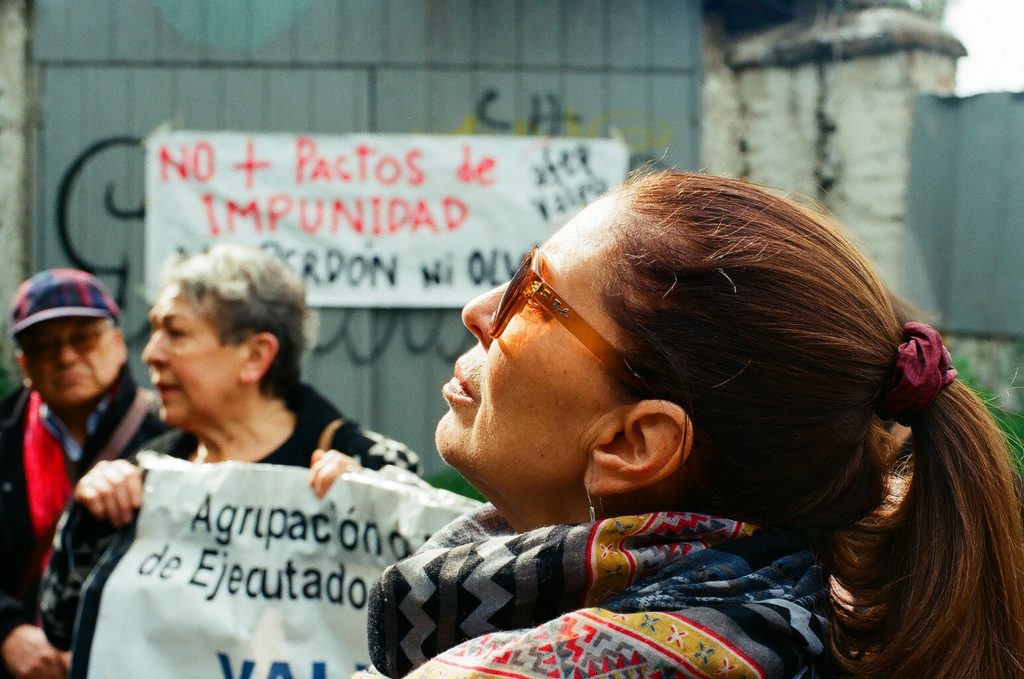Pachi Bustos is a journalist and documentary filmmaker. She has worked as a director, writer, and researcher for prestigious Chilean television programs and nationally and internationally renowned documentaries. She directed the award-winning documentaries “Video Sombra” (2000), “Actores Secundarios” (2004), and “Ángeles Negros” (2007). Her film “Cuentos sobre el futuro” won Best National Film at the 2012 Santiago International Film Festival as well as the Pedro Sienna Award for Best Documentary Feature in 2013.
“Haydee and the Flying Fish” will premiere at the 2019 Hot Docs Canadian International Film Festival on April 30.
W&H: Describe the film for us in your own words.
PB: “Haydee and the Flying Fish” tells the story of a woman facing a turning point in her life: the end of a long trial that sentences her torturers and her son’s murderers—a son she carried in her womb when she was arrested by Pinochet’s dictatorship at the age of 21.
This is a historic case: the first conviction for torture against a pregnant woman by Chilean Navy agents. But [the film] is not just the story of a single court case. Haydee’s story and her strength, conviction, and commitment also convey how resilience, affection, and networking are fundamental tools for resistance and advancement towards justice.
W&H: What drew you to this story?
PB: First of all, the main character, Haydee, whom I met ten years ago. I found her story of detention and torture heartbreaking, but what struck me the most was her attitude towards life. Her strength, energy, and commitment. Her sense of truth and justice. Her [ability] to retain these qualities in spite of the horrors she experienced.
Like her, 40,000 Chileans were acknowledged by the Commission on Political Prisoners and Torture as victims. However, this [acknowledgment] has not been met with justice. The survivors have become invisible within Chilean society—they are not recognized enough. Through Haydee’s story, the film can contribute to [their recognition].
W&H: What do you want people to think about when they are leaving the theater?
PB: I want them to empathize with Haydee’s story, and through her and the hundreds of stories from women in Chile, Latin America, and many parts of the world, envision how the physical and psychological repercussions of torture [persist].
Although more than 40 years have passed, the road towards justice in cases of human rights violations is still very difficult for hundreds of victims.
W&H: What was the biggest challenge in making the film?
PB: To make a film that talks about the horror [while] avoiding the morbid [and] explicit representations. To give a visual perspective on what was not left on record and what remained in time and in the body as the memory of pain.
W&H: How did you get your film funded? Share some insights into how you got the film made.
PB: We started this film almost five years ago. During the development and production stage, we obtained funds from two Chilean public institutions: CORFO and the Ministry of Arts, Cultures, and Heritage.
We received support as a co-production with Brazil through CURTA, a television channel. Thanks to them, it was possible to add resources from ANCINE, the Brazilian National Cinema Agency, and financing from the Audiovisual Fund and the Regional Development Bank Do Extremo Sul Fund.
W&H: What inspired you to become a filmmaker?
PB: I think it was curiosity and the desire to tell the unknown, invisible stories. The desire to give them visual quality and share them with many people.
W&H: What’s the best and worst advice you’ve received?
PB: The best advice is [to have] perseverance, confidence in the process, and the conviction that with work and enthusiasm, it’s possible to accomplish what you want for your projects.
Fortunately, I don’t think I’ve received any bad advice.
W&H: What advice do you have for other female directors?
PB: Don’t lose your passion. Don’t give up when things don’t turn out as you expected. Enjoy the road, seek alliances, and persevere.
W&H: Name your favorite woman-directed film and why.
PB: “The Beaches of Agnès,” directed by Agnès Vardá, is one of my favorite films and inspirations. Her endless creativity, her particular way of approaching the most diverse subjects, and her passion, sensibility, and tireless work are marvelously reflected in this documentary. It’s a manifesto of her work and her way of seeing and understanding filmmaking.
W&H: It’s been a little over a year since the reckoning in Hollywood and the global film industry began. What differences have you noticed since the #MeToo and #TimesUp movements launched?
PB: I feel women are even more empowered now—the older ones and especially the younger ones. I teach at universities and I see in my students that energy and confidence.
I love believing that young people and new generations are committed to a different world, where men and women can develop with equal opportunities and without discrimination.







